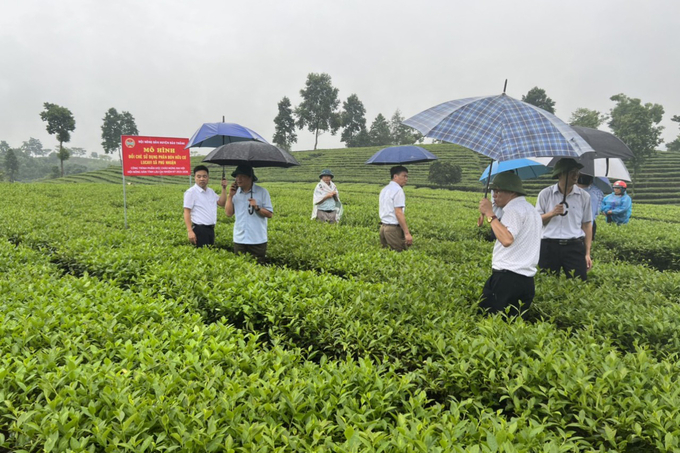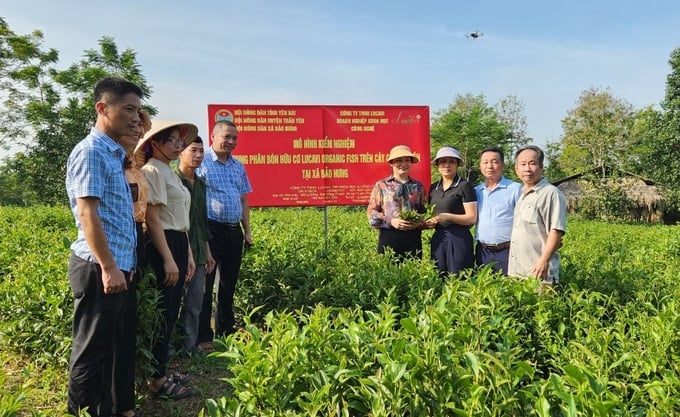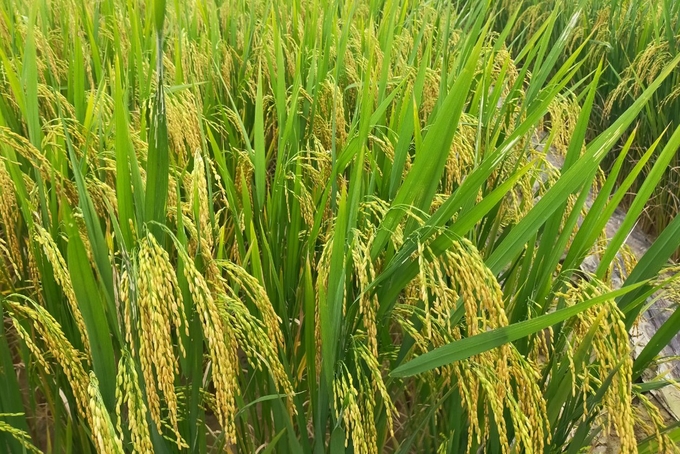May 24, 2025 | 16:27 GMT +7
May 24, 2025 | 16:27 GMT +7
Hotline: 0913.378.918
May 24, 2025 | 16:27 GMT +7
Hotline: 0913.378.918

Field meeting in Bao Thang, Lao Cai, visiting a tea field using Lucavi fertilizer. Photo: Huong Pham.
We want sustainable agriculture, for humanity and all species, today and tomorrow. Ecological agriculture encourages farmers to reuse raw materials on the farm. However, it is not always possible to have a closed, circular farm. Be it tea hills or rice fields, there must still be an input source of organic fertilizer to partially or completely replace chemical fertilizers.
In the case of tea trees in Lao Cai and Yen Bai, after accompanying the staff of Lucavi Co., Ltd. twice to field seminars, I was able to listen to people and officials evaluating the effectiveness of Lucavi fertilizer.
From the farmers’ perspective, their desire is to increase their income in a sustainable way. The tea processing and trading companies want good quality tea which meets the market’s standards and a high rate of finished products.
After three months of testing on tea trees in Bao Thang, Bao Yen, Bat Xat districts (Lao Cai province); Tran Yen, Yen Binh, Van Chan districts and Nghia Lo town (Yen Bai province), tea productivity of areas using Lucavi organic fertilizer increased by 10 - 30% compared to tea areas using chemical fertilizers, depending on the household.
The increase in tea productivity compared to the general model may be partly because of prolonged sunshine and water shortage. Applying Lucavi fertilizer by spraying a 1% solution on the leaves provides water for the plant. Yield increases but fertilizer costs decrease when farmers switch to using Lucavi fertilizer. The time for a crop of machine-cut tea is reduced by 5-7 days/batch. This opens the possibility of one more batch of tea per year.
Speaking at a seminar on October 24, 2023 to evaluate the effectiveness of Lucavi fertilizer in Lao Cai province, Vu, a farmer in Bao Thang district, said he has been using Lucavi fertilizer for 3 ha of tea since August 2023. The batch of tea collected in October 2023 is 11 tons, an increase of 1 ton compared to the tea batch in August which used chemical fertilizers.

Bat Tien tea hill, Bao Hung commune, Tran Yen district, Yen Bai province. Photo: Huong Pham.
Applying Lucavi organic fertilizer comes with two big advantages. The first is labor saving. Applying synthetic NPK fertilizer on 1 ha requires 4 workers, while spraying Lucavi on 1 ha only requires 1 worker. In case the weather is dry for a long time, tea trees can still quickly absorb Lucavi.
As for NPK fertilizer, if the dry weather prolongs, tea trees cannot absorb it and the tea batch will be considered lost. Vu also mentioned that increasing productivity by 10% per batch of tea is not as beneficial as having one more batch of tea per year. With his 3 ha of tea area, increasing 10 - 11 tons of tea per crop means increasing his total income by VND 65 - 71.5 million per year.
The second advantage is quality. To give a basic evaluation, Bat Tien tea grown with Lucavi fertilizer is more fragrant and tastier than Bat Tien tea grown with chemical fertilizers. Analytical results of hand-picked Bat Tien tea in Nghia Lo town, Yen Bai province show that the total Polyphenol content reached 16.5 mg/100 g, higher than the required threshold of 11 mg/100 g. Heavy metals such as lead, arsenic, and cadmium are not detected. The rate of finished products after drying is 10% higher compared to the conventional farming model.
According to Thuan, the owner of a tea processing and trading business, the tea fertilized with Lucavi has shorter stems, wider leaves, larger tea balls, and a lower scrap ratio than tea fertilized with seaweed fish protein (tea fertilized with seaweed fish protein has long stems, small leaves, and high scrap ratio).

GL 25 rice variety fertilized with Lucavi at the Field Crops Research Institute. Photo: Huong Pham.
Besides economic benefits, leaders of Bao Yen district and Chairman of Lao Cai Farmer’s Union also highlighted environmental benefits and soil improvement when using Lucavi organic fertilizer. Using organic fertilizers on tea and crops results in stable income for people in the province, which is consistent with the province's policy of converting toward ecological agriculture and organic agriculture.
Lucavi's effectiveness on food crops is further tested at present. Within the framework of the experiment at the Field Crops Research Institute, Lucavi fertilizer was applied to rice and vegetables. As for the initial result, the plants grew and developed well. The tomato garden planted on September 18 has now bloomed its first flowers, green and healthy. The rice on the field is goldenly ripe and about to be harvested. In Hai Duong province, Lucavi is being tested on carrots in Duc Chinh (Cam Giang) and all kinds of vegetables at Tan Minh Duc Cooperative (Pham Tran commune, Gia Loc district).
Translated by Samuel Pham

(VAN) The People's Committee of Tra Vinh province has approved an adjustment to the investment policy for the Green Hydrogen Plant project, increasing its area to approximately 52.76 hectares.
![Reducing emissions from rice fields: [2] Farmers’ commitment to the soil](https://t.ex-cdn.com/nongnghiepmoitruong.vn/608w/files/news/2025/05/05/dsc08881jpg-nongnghiep-140632.jpg)
(VAN) Clean rice cultivation model in Thuong Tan commune, Bac Tan Uyen district, is assisting local residents in achieving sustainable agriculture by substantially reducing costs, increasing productivity, and protecting the environment.

(VAN) At the conference to disseminate Resolution No. 68, AgriS introduced its digital agricultural ecosystem and reaffirmed its commitment to accompanying the Government in promoting private sector development and sustainable agriculture.

(VAN) 'Blue Ocean - Blue Foods' initiative is designed to restore marine ecosystems and establish sustainable livelihoods for local communities by cultivating a minimum of 1,000 hectares of cottonii seaweed in the first three years.
/2025/05/21/4642-3-112707_603.jpg)
(VAN) The V-SCOPE project has made direct contributions to three out of six pillars of the Comprehensive Strategic Partnership between Vietnam and Australia.

(VAN) Facing the threat of rabies spreading to the community, Gia Lai province urgently carries out measures to vaccinate dogs and cats on a large scale.

(VAN) Disease-free livestock farming not only protects livestock herds but also stabilizes production and livelihoods for many farmers in Tuyen Quang.